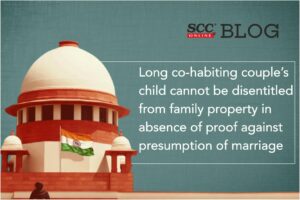Supreme Court: In a family property dispute wherein the legitimacy of one of the contenders was questioned, the bench of SA Nazeer and Vikram Nath, JJ has held that if a man and a woman live together for long years as husband and wife, there would be a presumption in favour of wedlock and since in the present case, the defendants had failed to rebut the presumption in favour of a marriage between the plaintiff’s parents on account of their long co-habitation, he cannot be held to be an illegitimate son.
In the case at hand, the suit property belonged to a family governed by the Mitakshara Law of Inheritance. The said property originally belonged to one Kattukandi Edathil Kanaran Vaidyar who had four sons, namely, Damodaran, Achuthan, Sekharan and Narayanan. Achuthan had a son. Sekharan and Narayanan did not marry. Damodaran married one Chiruthakutty and they had a son by the name of Krishnan. However, the defendants contended that Damodaran never married Chiruthakutty and hence, by virtue of illegitimacy, Krishnan, the first plaintiff, cannot claim share in the property.
The Trial Court on examination of the evidence on record held that Damodaran had a long co-habitation with Chiruthakutty and that due to such co-habitation, it could be concluded that Damodaran had married Chiruthakutty and that the first plaintiff was the son born in the said wedlock. The Trial Court accordingly passed a preliminary decree for partition of the suit property into two shares and one such share was allotted to the plaintiffs.
The Kerala High Court, however, held that the first plaintiff was the son of Damodaran and Chiruthakutty, but not a legitimate son.
Before the Supreme Court, the plaintiff argued that since their marriage took place more than 50 years prior to filing of the suit (now 90 years), there is no possibility of having any documentary evidence of their marriage. He, however, produced documents wherein there were references to periodical payments made to Chiruthakutty from the husband’s house. Witnesses also examined on behalf of the plaintiffs in support of his contention. Hence, it was submitted that the documents would conclusively show that the first plaintiff was the son of Damodaran and Chiruthakutty and the contention of the defendants that Damodaran died as a bachelor or without any legitimate son, cannot be believed at all.
At the outset, the Court reiterated the settled law that if a man and a woman live together for long years as husband and wife, there would be a presumption in favour of wedlock. Such a presumption could be drawn under Section 114 of the Evidence Act. Although, the presumption is rebuttable, a heavy burden lies on him who seek to deprive the relationship of legal origin to prove that no marriage took place.
Coming to the facts of the case, the Court took note of the contention of the plaintiffs that the marriage of Damodaran and Chiruthakutty was performed in the year 1940. There was clear evidence that the first plaintiff was born on 12.05.1942. The documents produced by the plaintiffs were in existence long before the controversy arose between the parties. Hence, these documents, coupled with the evidence of witnessed, showed the long duration of cohabitation between Damodaran and Chiruthakutty as husband and wife.
The Court held that the defendants failed to rebut the presumption in favour of a marriage between Damodaran and Chiruthakutty on account of their long co-habitation. Hence, the impugned judgment of the High Court was set aside and the judgment and decree passed by the Trial Court was restored.
[Kattukandi Edathil Krishnan v. Kattukandi Edathil Valsan, 2022 SCC OnLine SC 737, decided on 13.06.2022]
*Judgment by: Justice SA Nazeer
For plaintiffs: Senior Advocate V. Chitambaresh
For defendants: Senior Advocates R. Basant and V. Giri

